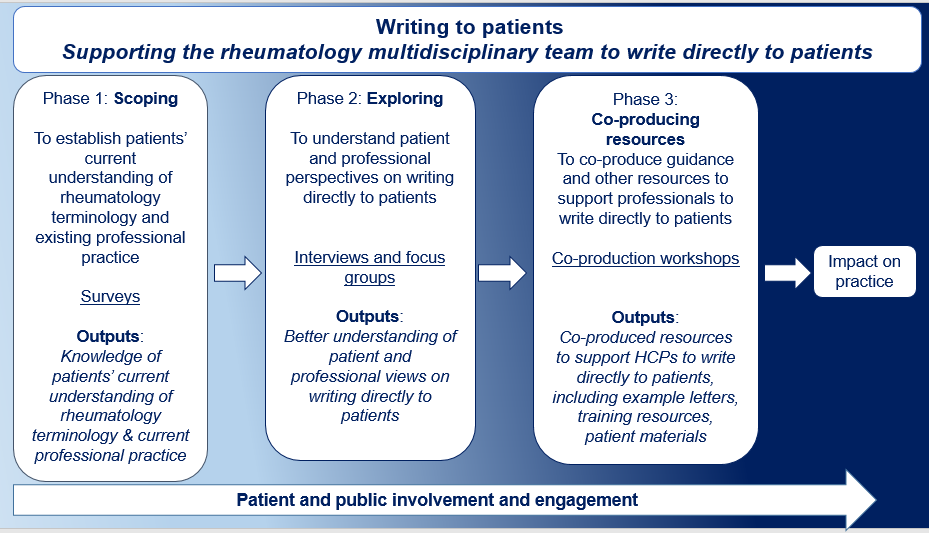
Supporting the rheumatology multidisciplinary team to write directly to patients
What is the project?
Healthcare professionals, like doctors, nurses, physiotherapists and pharmacists, see people with rheumatology conditions in the outpatient clinic. Following the appointment, the healthcare professional will usually write a letter to summarise the clinic visit.
In the past, this letter would have been sent to the patient’s general practitioner (GP). A copy would also have been sent to the patient for their records.
This approach could cause confusion for the patients as they might not have understood the complicated medical terminology included in this type of letter.
Many organisations who advise healthcare professionals on how best to communicate with patients now advise professionals to write clinic letters directly to the patients, with a copy sent to the patient’s GP. Although this approach has been encouraged for more than five years, it has yet to be widely adopted.
This research project aims to investigate and understand current patient and healthcare professional perspectives and practice on writing directly to patients. We will work with patients and professionals to co-produce resources to support the rheumatology multi-disciplinary team to write directly to patients.
Project overview
We will be inviting patient and public involvement and engagement throughout the project phases.
Phase 1: Scoping
- Surveys: To establish patients’ current understanding of rheumatology terminology and existing professional practice.
- Outputs: Knowledge of patients’ current understanding of rheumatology terminology and existing professional practice.
Phase 2: Exploring
- Interviews and focus groups: To understand patient and professional perspectives on writing directly to patients.
- Outputs: Better understanding of patient and professional views on writing directly to patients.
Phase 3: Co-producing resources
- Co-production workshops: To co-produce guidance and other resources to support professionals to write directly to patients.
- Outputs: Co-produced resources to support health care professionals to write directly to patients, including example letters, training resources and patient materials.
After the final phase
- Impact on practice.

Who is involved in the project?
 The project is led by Dr Charlotte Sharp who is a consultant rheumatologist in Manchester and also works as an academic researcher. Charlotte says: ‘I am really excited to get started on this project and to find out how we can improve the way we write to patients. I always involve patients in projects and really value their input because I know what a big difference patient involvement makes to the quality of the research.’ We have great representation from a range of professionals who look after people with rheumatology conditions. This includes:
The project is led by Dr Charlotte Sharp who is a consultant rheumatologist in Manchester and also works as an academic researcher. Charlotte says: ‘I am really excited to get started on this project and to find out how we can improve the way we write to patients. I always involve patients in projects and really value their input because I know what a big difference patient involvement makes to the quality of the research.’ We have great representation from a range of professionals who look after people with rheumatology conditions. This includes:
- Professor Will Dixon (clinical academic consultant);
- Dr Lizzy MacPhie (consultant rheumatologist);
- Jill Firth (consultant nurse);
- Will Gregory (consultant physiotherapist);
- Dr Brian McMillan (academic GP).
Clinicians from rheumatology outpatient department from across all four nations of the UK (England, Scotland, Northern Ireland and Wales) will be involved in recruiting patients and clinicians to participate in the study.
How will patients and the public be involved?
 Karen Staniland is the patient lead for the project and this is the third study she has joined as a patient. She has had rheumatoid arthritis for 12 years and is very passionate about patient involvement in research. Karen has contributed to the design of the study and will guide the patient and public involvement and engagement strategy, in co-design with the research team. She is an equal member of the research team. A four-person patient and public involvement and engagement group will be recruited with individuals including a range of characteristics to ensure engagement with a diversity of opinions. Members will be paid for their time in keeping with national guidance.
Karen Staniland is the patient lead for the project and this is the third study she has joined as a patient. She has had rheumatoid arthritis for 12 years and is very passionate about patient involvement in research. Karen has contributed to the design of the study and will guide the patient and public involvement and engagement strategy, in co-design with the research team. She is an equal member of the research team. A four-person patient and public involvement and engagement group will be recruited with individuals including a range of characteristics to ensure engagement with a diversity of opinions. Members will be paid for their time in keeping with national guidance.
How has the research been funded?
The Advanced Research Fellowship was awarded to Dr Charlotte Sharp and collaborators by the British Society for Rheumatology. The Society supports rheumatology healthcare professionals in their roles caring for patients with rheumatological conditions such as rheumatoid arthritis, systemic lupus erythematosus, osteoporosis and vasculitis. The project will run for 19 months from the beginning of October 2023 until the end of April 2025.

What will the outcomes and outputs from the project be?
Outcomes
- A better understanding of patient and healthcare professional opinions on the pros and cons of writing clinic letters directly to patients.
Outputs
- Co-production of resources to support healthcare professionals to write directly to patients. These might include example letters, glossaries, training materials, blogs, vlogs and patient materials.
We hope to obtain funding in the future to evaluate the impact of these resources on clinical practice.
Find out more about this project
Please email Charlotte Sharp for more information:


0 Comments